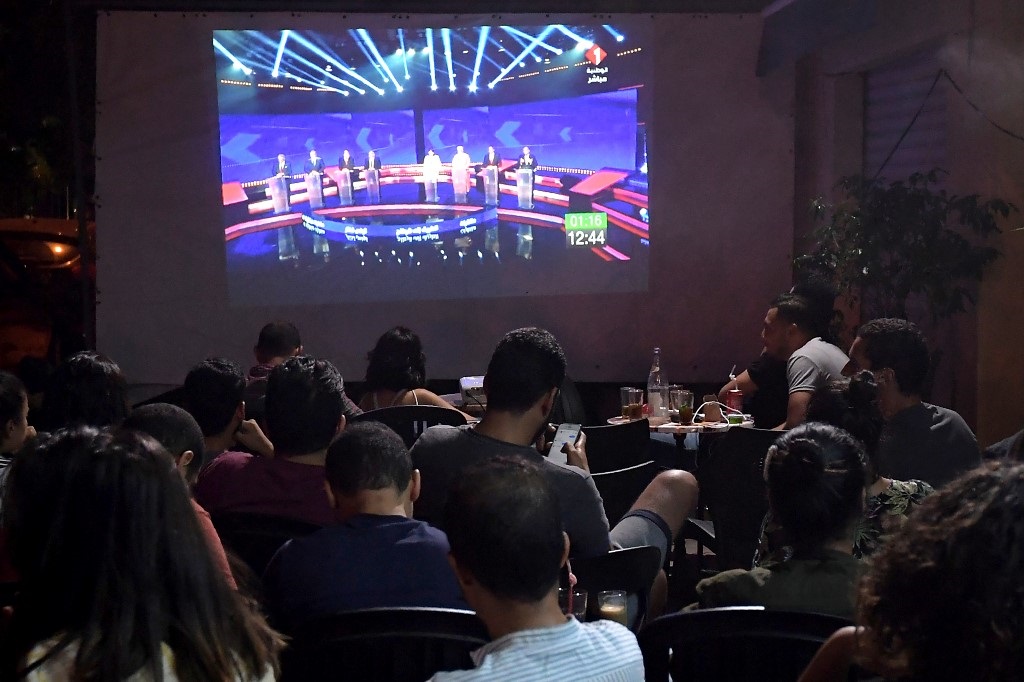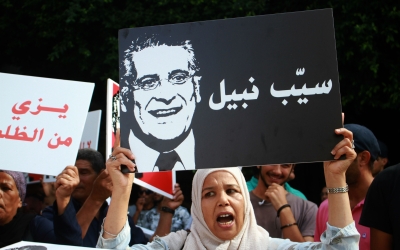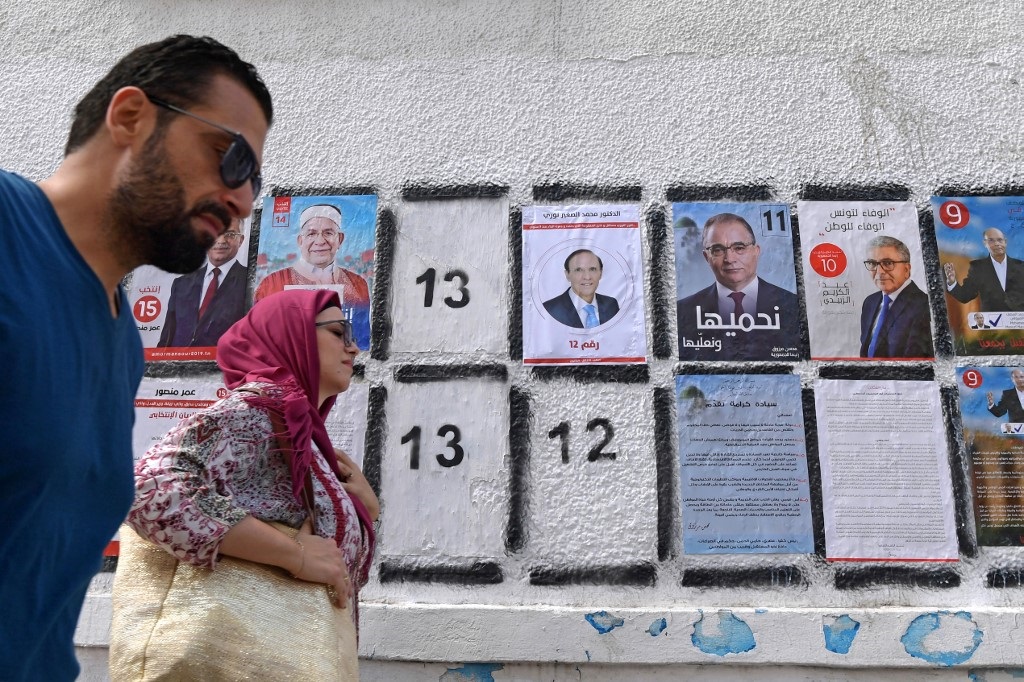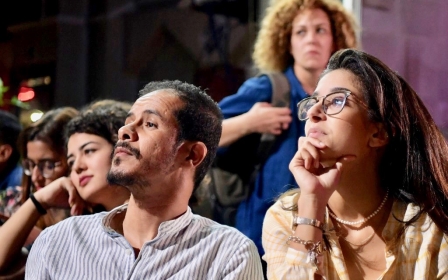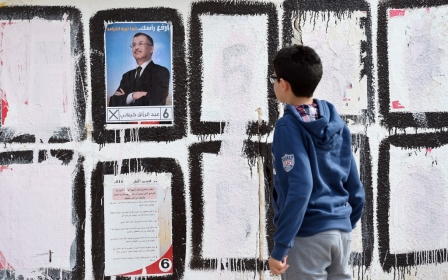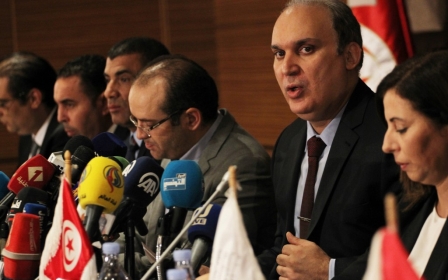Open for debate: Tunisia's presidential hopefuls face off in first for country
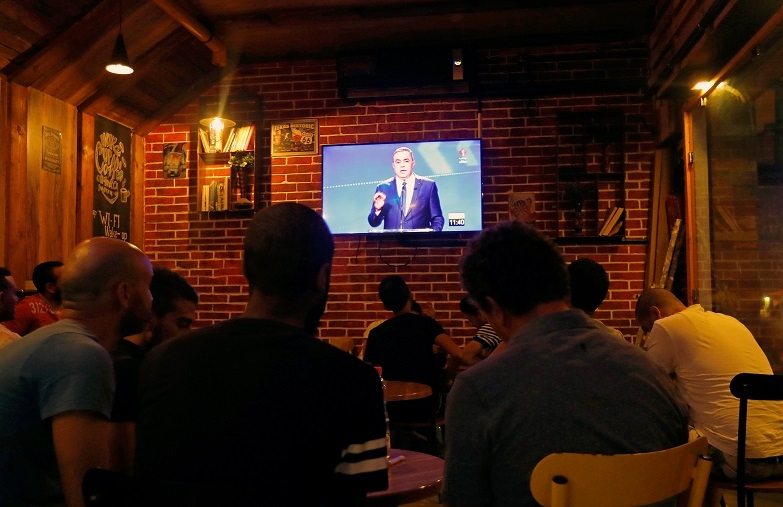
To some, it was like a sporting event. To others, a total drag. Either way, the past three days, as Tunisia’s presidential candidates tried to persuade voters in a series of debates, were historic for the country and the region.
“It is something we couldn’t even dream of in the past,” said Yassine Ayari, an independent MP and founder of the Hope and Work civil society movement.
'Candidates in the past saw debating for the sake of winning voters as humiliating'
- Yassine Ayari, independent MP
With the first round of voting scheduled for 15 September, the election itself is, of course, also significant as voters will decide who will become the country’s only second democratically elected leader since the 2011 revolution.
But live televised debates in Tunisia, before or after the uprisings, were unheard of until now.
“Candidates in the past saw debating for the sake of winning voters as humiliating,” Ayari told Middle East Eye.
New MEE newsletter: Jerusalem Dispatch
Sign up to get the latest insights and analysis on Israel-Palestine, alongside Turkey Unpacked and other MEE newsletters
So on Saturday evening, presidential hopefuls were beamed into Tunisia’s bars, restaurants and living rooms as they faced off over issues from national security to foreign policy and described their plans for their first 99 days in office.
Tarek Kaouache, a Tunis-based social entrepreneur, was eager to watch.
“My friends and I are prepared as if our national football team is playing tonight, with beers that go well with barbecue,” Kaouache told MEE.
"Voters will be able to compare the clarity and the quality of the arguments of the different candidates placed under the same conditions."
'A level playing field'
Observers say the debates have offered Tunisians a rare chance to be exposed to the policies and platforms of candidates without the sway of a polarised media.
“These debates provide a level playing field for all candidates. That’s what makes them important,” said Chaima Bouhlel, former president of Al Bawsala, a Tunis-based organisation monitoring parliamentary activity and promoting the rights of citizens.
None of the 26 candidates have grown up in a debate culture, she added, but the process will be a learning experience for future debates nonetheless.
Khalil Amiri, a team member working on the campaign of Abdelfattah Mourou, the candidate of the Muslim-democratic party Ennahda, said they will be a welcome respite as many media outlets in the country maintain loyalty to certain candidates in their coverage.
“This debate will enable citizens to make a more informed choice, based on objective criteria. And therefore, strengthen citizens’ confidence in the democratic process,” Amiri said.
With so many hopefuls, each night featured a smaller group of all of the candidates with the exception of Nabil Karoui, who remains in prison over money laundering and tax-evasion charges; and Slim Riahi, a businessman who has lived abroad since he was found guilty of corruption and check fraud in January.
Saturday’s debate featured Mourou alongside other top-polling candidates including Abir Moussi, leader of the Free Destourian party (PDL) and an open supporter of the ousted Ben Ali regime, and Mohamed Abbou, leader of the left-wing Democratic Current.
With only two weeks to campaign, including relentless interviews and travelling, campaign managers said their candidates barely had time to get themselves in shape for the live event, only learning the details of how the debate would run hours before the start on Saturday.
And they had to keep on their toes with 90 seconds each to answer rapid-fire questions, randomly assigned by well-known journalists who acted as moderators over the nearly two-hour debate.
All three debates addressed a wide array of the country’s most pressing issues, including the debt crisis, home-grown terrorism, socio-economic inequality and the shrinking middle class, corruption and instability in neighbouring Libya.
The candidates also navigated one of the most fundamental issues overshadowing the elections: the limits of the constitutional powers of the president, often blamed for the country’s political paralysis.
Under the current constitution, presidential powers are limited to national security, foreign policy and defence. Ahead of the debates, several candidates vowed to put forward a constitutional amendment that would empower the presidency.
On Saturday night, however, Mohamed Abbou stood out from the other candidates, saying that “presidential powers, for example, should not include the prevention of car accidents”.
'I would have preferred to see an interactive debate, rather than getting stuck in the muck of problem analysis'
- Tarek Kaouche, social innovation consultant
He said, however, that foreign powers have caused “massive political corruption”, with “political dynasties” still dominating Tunisian politics. He claimed that a corrupt political class is backed by Gulf-states and vowed to resist that foreign influence once elected.
Abir Moussi promoted herself as an Ennahda antagonist and promised to open investigations into the alleged relationship between certain political parties - mainly Ennahda- and terrorism and to prevent religion and politics from mixing.
Mourou, casting himself as a figure of stability, promised “to enhance civil rights by digitalising the public administration”, which he said would prevent arbitrary treatment and prevent corruption.
Radwan Masmoudi, founder and president of Washington, DC-based Center of the Study of Islam & Democracy (CSID), said he believed that Mourou, Moncef Marzouki and Abbou were the winners of the first of the three debates.
Tarek Kaouche, a social innovation consultant watching with his friends over barbecue in Tunis, gave the event three out of ten stars.
“I would have preferred to see an interactive debate, rather than [the candidates] getting stuck in the muck of problem analysis,” he said.
'Utterly bored'
On Sunday morning, visitors at the busy weekly flea market in Bouselsla were little impressed.
“I was utterly bored,” said Touati Wided, a 20-something resident of the popular neighbourhood, standing next to a second-hand clothes stall. “I really tried to follow the debate. I pulled out quickly, but will try to watch it again tonight.”
Farah Ayoumi, a woman in her 40s, said she hadn’t watched the debates. She “had something better to do”.
“Politics is not for me. However, I will vote for Kais Saied, an independent conservative candidate.”
Night two of the debates featured a matchup between defence minister and independent candidate Abdelkrim Zbidi - supported by ruling party Nidaa Tounes - Mohsen Marzouk, leader of Machrou Tounes, a spin-off party from Nidaa Tounes, and Mongi Rahoui, leader of a coalition of left-wing splinter parties and six others.
'It is something we couldn’t even dream of in the past'
- Yassine Ayari, independent MP
With many candidates and little time, there was no second chance to make a first impression. The second evening brought less specific policy prescriptions, and slightly loftier, big-picture discussion.
Zbidi’s support took a hit last week after he revealed that he had considered sending the army into parliament to restore order after the terrorist attacks in June. But his popularity seems to have survived the blip – and in the debate, he focused on something entirely different.
"For me, there is an important issue, that of women. I undertake to appoint women to positions of responsibility,” the former minister said, attempting to boost his profile as a worthy successor to the late President Essebsi who was advocating for equal inheritance between men and women when he died in July.
Zbidi and Marzouk are both advocates of the centrist project which was initiated by Habib Bourguiba, Tunisia’s first president after declaring independence, who was branded - and Tunisia under him - as a "women’s rights champion".
“I will be a modern president of a modern state, who will use his right to go before parliament, not just sit there. I will be a president who will spend days in the regions in the interior of the country, close to the people, as Bourguiba did,” Marzouk said.
'Not a football game'
The first-ever debates closed on Monday night with eight candidates, including current Prime Minister Youssef Chahed, Hamma Hammami from the left-wing Front Populair party and the independent conservative Kais Said, often associated with Ennahda and said to appeal to many in the country's less privileged areas outside the capital.
Chahed, who has been accused of manipulating justice in the case against Nabil Karoui, was asked how he would guarantee the independence of the judiciary if elected.
'It's not a football game. It's a people who are learning to choose their destiny'
- Kais Ben Sedrine, Tunisian observer
"There are a lot of things to do," he said, without much elaboration.
Hammami promised to pull Tunisia out of negotiations with the EU to establish a "deep and comprehensive free trade area" - known in Tunisia by its French acronym ALECA - and to restore the country's sovereignty.
Said, meanwhile, said he would support a mandatory death penalty for anyone convicted of terrorism.
Will the debates impact how Tunisians vote? Polls are banned during the two weeks of campaigning so it’s hard to gauge what impact they will have, though researchers say around 3 million Tunisians - or just under 30 percent - of the population watched.
Masters student Camelia Daoulette, however, was not one of them. "A bunch of idiots. I only saw a small part," she said. "As a matter of principle, I don't vote."
Looking at a photo of fellow young Tunisians watching the debates at a pub, Kais Ben Sedrine said: "It's not a football game. It's a people who are learning to choose their destiny. What pride despite the mediocrity of the offer."
Middle East Eye delivers independent and unrivalled coverage and analysis of the Middle East, North Africa and beyond. To learn more about republishing this content and the associated fees, please fill out this form. More about MEE can be found here.


